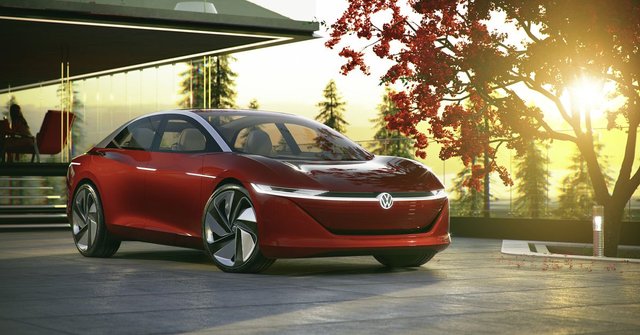VW’s all-electric I.D. Vizzion coming ‘by 2022’ with 400 miles of range
The latest addition to Volkswagen’s I.D. lineup of futuristic concept cars won’t just be some far-flung futuristic design piece meant to poke at what a fully-autonomous car should look like. Today at the Geneva Motor Show, the company announced that it also plans to release a production version of the I.D. Vizzion, too. The all-electric Vizzion will hit the road “by 2022 at the latest,” VW says, and unlike the concept version that was originally teased last month, it will come with a steering wheel and pedals.
VW still claims that, like the concept, the production car will be able to reach over 400 miles on a single charge thanks to a battery pack that, at 111kWh, is bigger than anything Tesla currently offers. A 75kW motor will power the front wheels, while a 150kW motor will power the rear, which should give this all-wheel-drive sedan about 300 horsepower.
The exterior of the I.D. Vizzion is reminiscent of the low-riding Lucid Air EV, though it is distinguished by some very VW curves in the body work. It’s a much more exciting design language than the stuffy new Jetta that VW showed off in Detroit for sure. The Vizzion looks right at home in the same lineup as the I.D. Crozz, VW’s sharp, futuristic crossover SUV concept. It’s also far less gauche than the I.D. Buzz microbus prototype. All told, the Vizzion looks and sounds like it will be fun to drive.
The Vizzion will eventually become fully autonomous, but VW’s going to sell a more familiar version first
That said, VW is very much trying to shape the early conversation about the I.D. Vizzion to include what it might someday evolve into once the car is capable of completely driving itself. In fact, every one of the new photos of the Vizzion that VW released today show a version of the car without a steering wheel, pedals, or even buttons, echoing the promise the company made when it released the first teaser images in February.
Here’s how VW thinks a ride in such a version of the Vizzion might go. The company estimates that, sometime around twelve years from now, you might hop into a fully driverless Vizzion. The car knows who you are thanks to facial recognition, and so it adjusts the seats, lighting, environmental controls, and even scents to your liking. It also, perhaps, instantly pulls up your favorite video streaming service, which maybe in turn loads the show you left paused at home.
There are no screens; the concept renderings released today instead show something that looks like either projection onto the windshield or some kind of hologram. As such, along the whole ride to your destination, you won’t have to touch a single button. All you’ll need is your voice, and maybe a wave or two of your hand.
This potential future is not unique in the auto industry, which has spent the better part of the last decade dreaming up similar ideas regarding how self-driving cars might change the experience of driving. Many of the most far-out suggestions being made by VW have been teased by major carmakers and startups alike. If anything, VW’s vision of a fully-autonomous car is conservative, considering that the interior of the car looks almost indistinguishable from something that could hit the road today.
Some of the Vizzion’s most futuristic flourishes are the kinds of ideas we’ve already seen
There are other futuristic flourishes on the Vizzion, though they’re not any less derivative. The rear window has OLED display technology embedded in it, which VW imagines being used to act as a big brake light. (A peculiar idea considering the car is aimed at a future where the roads are full of cars that drive themselves.) A matrix of LED lights in the Vizzion’s grille will be able to project specific images or messages in front of the car, like a light-up crosswalk meant to show pedestrians that the car is ceding them the right of way. Both of these ideas have been teased by concept cars past.
VW is making a very big bet on electric cars over the next decade or so, and the I.D. Vizzion — much like its I.D. siblings — looks like it will be a centerpiece of that push. It could just the same become a sort of flagship for VW’s eventual fully autonomous fleet, which VW obviously wants everyone to be thinking about, but that future is still very far away.
In the meantime, thinking about the I.D. Vizzion in terms of it being a completely self-driving car — at least in the way VW is presenting it this week at Geneva — makes it harder to understand why anyone would care that the car is a VW. The exterior design is the car’s most distinct feature; everything else inside is really just the same kind of stuff being promised by the competition. Even VW knows this problem is coming, though boss Herbert Diess sees it in a different light. “The I.D. Vizzion shows that we will not just be using uniform tin boxes in the electric, self-driving future,” he said in a statement.
There’s certainly plenty of time for these companies to find ways to distinguish their fully self-driving offerings, which is good, because that stuff matters more when you’re no longer in control of the car. That’s why it’s a relief to find out that, in the meantime, we’re at least getting a more familiar version — steering wheel and all — of the Vizzion sometime in the next few years.